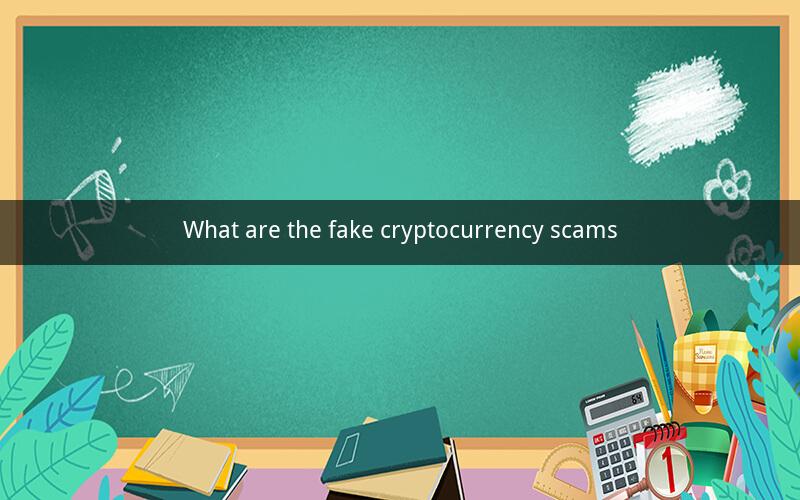
Fake Cryptocurrency Scams: Unveiling the Deceitful World
Table of Contents
1. Introduction to Cryptocurrency Scams
2. Types of Cryptocurrency Scams
2.1 Phishing Attacks
2.2 Ponzi Schemes
2.3 Fake Exchanges
2.4 Pump and Dump Schemes
2.5 Investment Scams
3. How Scammers Operate
4. The Consequences of Falling for a Cryptocurrency Scam
5. Protecting Yourself from Cryptocurrency Scams
6. Reporting Scams
7. Conclusion
1. Introduction to Cryptocurrency Scams
Cryptocurrency scams have become increasingly prevalent as the popularity of digital currencies grows. These scams exploit the lack of understanding and the excitement surrounding cryptocurrencies to defraud unsuspecting individuals. It is crucial to be aware of these scams and take necessary precautions to protect oneself.
2. Types of Cryptocurrency Scams
2.1 Phishing Attacks
Phishing attacks involve scammers sending fraudulent emails or messages that appear to be from legitimate cryptocurrency exchanges or wallets. These messages often prompt users to click on a link or download an attachment, leading to the installation of malware or the theft of personal information.
2.2 Ponzi Schemes
Ponzi schemes are pyramid-like scams where early investors are promised high returns, which are supposedly generated from the investments of new participants. As more people join, the scheme collapses, leaving investors with substantial losses.
2.3 Fake Exchanges
Fake exchanges mimic legitimate cryptocurrency platforms but are designed to steal funds. They may offer attractive features and services, but in reality, they are designed to steal users' private keys or personal information.
2.4 Pump and Dump Schemes
Pump and dump schemes involve scammers artificially inflating the price of a cryptocurrency, often through false news or social media manipulation. Once the price is high, they sell their holdings, leaving others holding the bag.
2.5 Investment Scams
Investment scams can take various forms, including fraudulent ICOs (Initial Coin Offerings), fake investment platforms, and Ponzi schemes. These scams promise high returns with little to no risk, but in reality, they are designed to defraud investors.
3. How Scammers Operate
Scammers use various tactics to deceive victims, including:
- Pretending to be legitimate entities or individuals
- Creating urgency or fear to pressure victims into making quick decisions
- Offering unrealistic returns
- Using social engineering techniques to gain trust
4. The Consequences of Falling for a Cryptocurrency Scam
The consequences of falling for a cryptocurrency scam can be severe, including:
- Financial loss
- Identity theft
- Emotional distress
- Loss of trust in the cryptocurrency community
5. Protecting Yourself from Cryptocurrency Scams
To protect yourself from cryptocurrency scams, consider the following tips:
- Conduct thorough research on any cryptocurrency or platform before investing
- Be wary of unsolicited messages or offers
- Use secure and reputable exchanges and wallets
- Keep your private keys and personal information confidential
- Stay informed about the latest scams and frauds
6. Reporting Scams
If you suspect you have fallen victim to a cryptocurrency scam, report it to the relevant authorities and platforms. This can help prevent others from falling victim to the same scam.
7. Conclusion
Cryptocurrency scams are a significant threat to the integrity of the digital currency ecosystem. By understanding the types of scams, how they operate, and taking necessary precautions, individuals can protect themselves from falling victim to these fraudulent schemes.
---
10 Questions and Answers
Q1: How can I identify a phishing attack in a cryptocurrency context?
A1: Look for signs of suspicious emails or messages, such as spelling errors, urgent requests for personal information, or links that don't match the official website. Always verify the sender's identity before clicking on any links.
Q2: What should I do if I receive a message promising high returns on a cryptocurrency investment?
A2: Be cautious. High returns with little to no risk are often red flags for scams. Verify the legitimacy of the investment opportunity and consider seeking advice from a financial advisor.
Q3: How can I tell if a cryptocurrency exchange is fake?
A3: Check for security features, such as two-factor authentication, a verified track record, and a transparent user base. If the exchange seems too good to be true, it probably is.
Q4: What are the signs of a Ponzi scheme in the cryptocurrency world?
A4: Look for promises of unsustainable returns, a lack of transparency, and the inability to withdraw funds. Ponzi schemes rely on new investors to pay off earlier investors, which eventually leads to the collapse of the scheme.
Q5: How can I protect my private keys from scammers?
A5: Store your private keys in a secure location, such as a hardware wallet or a secure password-protected software wallet. Never share your private keys with anyone, including supposed support staff.
Q6: What should I do if I think I've been scammed out of my cryptocurrency?
A6: Report the scam to the authorities and the relevant cryptocurrency platform. If possible, provide any evidence you have to help in the investigation.
Q7: How can I stay informed about the latest cryptocurrency scams?
A7: Follow reputable news sources, join cryptocurrency forums, and stay updated on the latest security alerts and warnings.
Q8: Can I recover my funds if I've been scammed?
A8: Recovery is possible in some cases, but it is not guaranteed. Report the scam to the authorities and work with experts who specialize in cryptocurrency recovery.
Q9: What are the legal implications of participating in a cryptocurrency scam?
A9: Participating in a cryptocurrency scam can lead to legal consequences, including fines and imprisonment. It is important to understand the risks and legal implications before engaging in any cryptocurrency-related activities.
Q10: How can I educate others about cryptocurrency scams?
A10: Share your knowledge and experiences with friends and family. Create informative content, such as blog posts or videos, and participate in online communities to help raise awareness about the dangers of cryptocurrency scams.